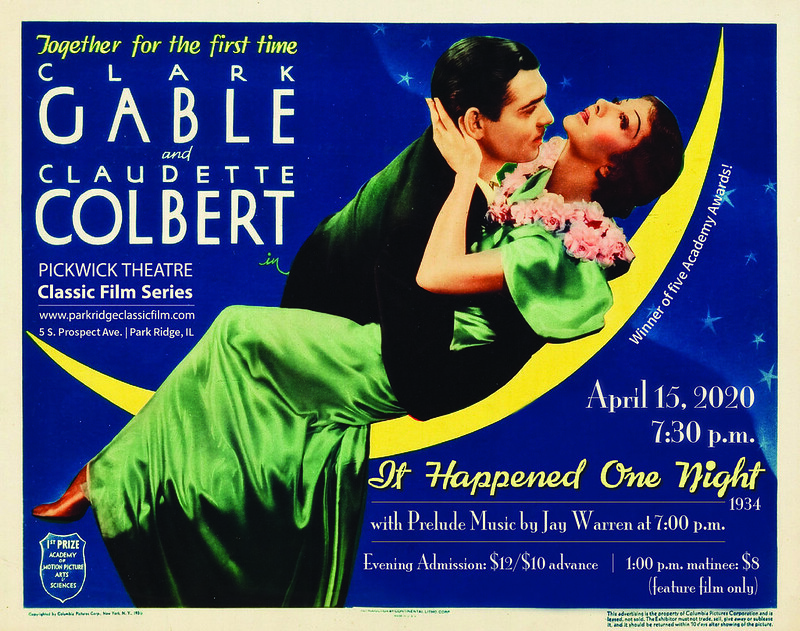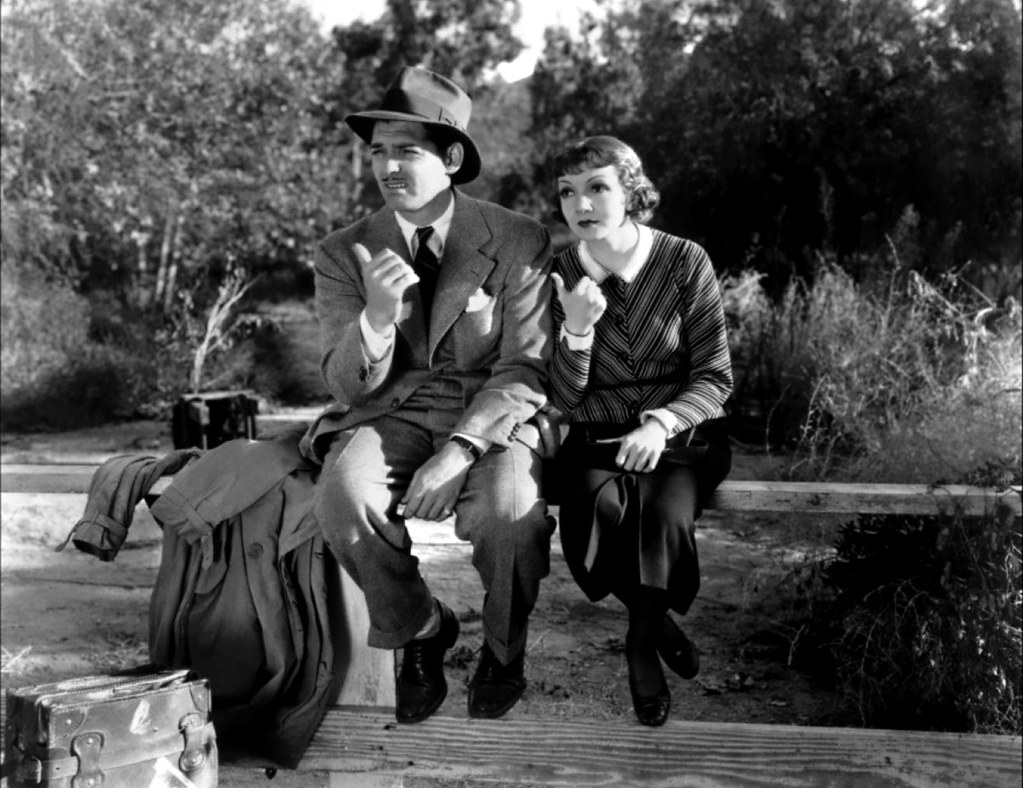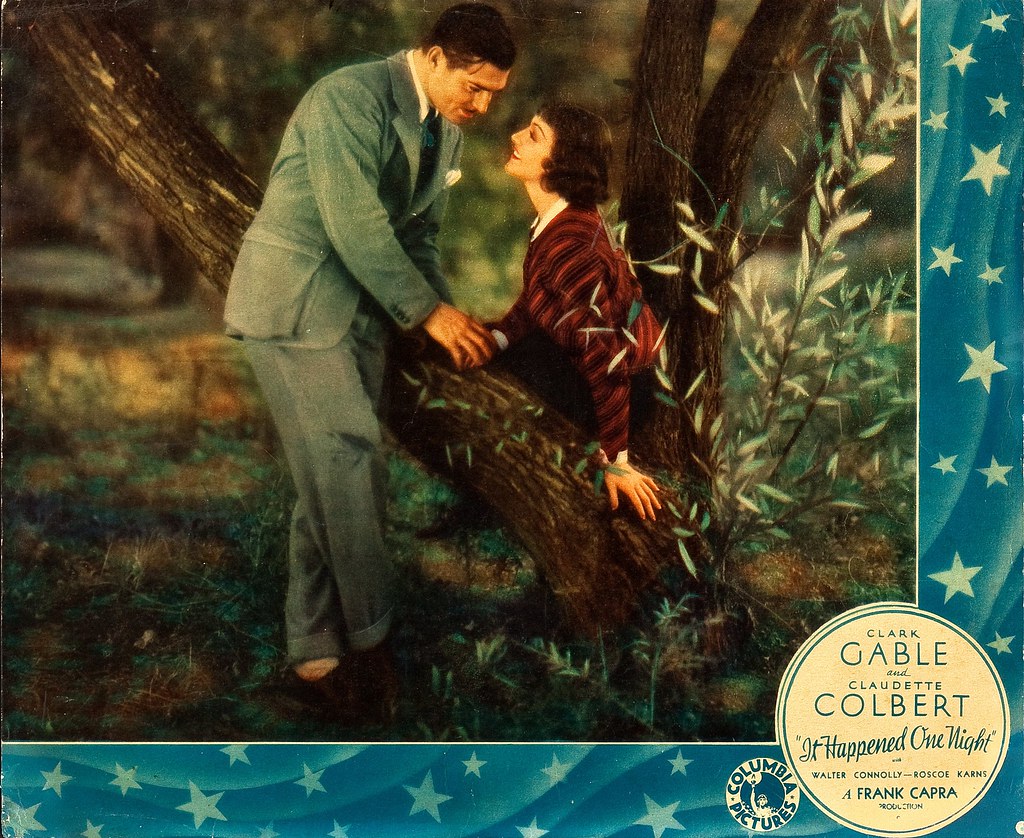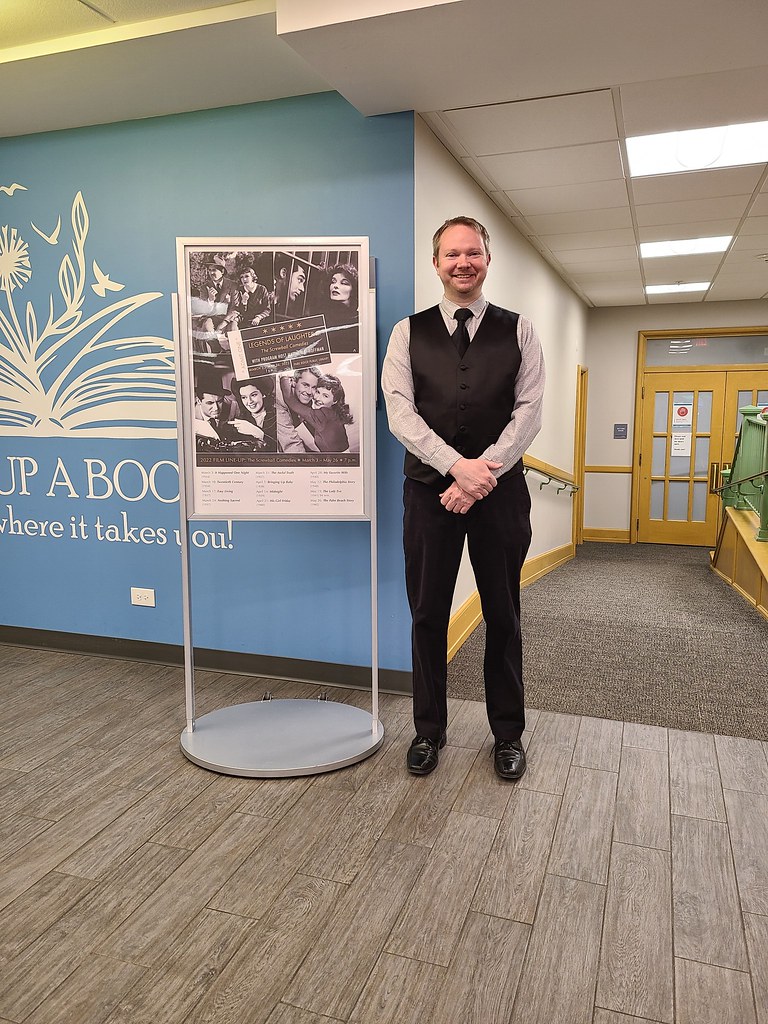On March 3, 2022, It Happened One Night (1934) was screened at the Park Ridge Public Library Classic Film Series. This was the first classic film shown at the library in two years. We had an attendance of 41 patrons (out of 50 available seats). It was a very receptive audience and everyone loved watching it again. One patron was seeing it for the first time, another was experiencing it on the “big screen” for the first time, and one lady came out from Elgin, Illinois, just to see it! The following is a transcript of my introduction to the film…
It Happened One Night was the first film to win all the major awards at the Academy Awards: Best Picture, Best Director, Best Actress, Best Actor, and Best Screenplay. Despite its critical as well as commercial success, It Happened One Night was not expected to be the hit it became. Since its release in 1934, however, the film has been embraced as one of the greatest American films of all time. A large part of the film’s success is due to its director, Frank Capra, but despite having his “name above the title,” he was far from being the only reason why this film is so well-loved. Nearly ninety years later, fans are still enchanted by the great acting performances on display.
Claudette Colbert stars as Ellie Andrews, a pampered society girl whose father disapproves of her recent marriage to a fortune-hunting aviator named King Westley. Dad wants the marriage annulled. Ellie escapes and plans to run away to New York to be with the man she thinks she loves. While on the night bus, she meets down-and-nearly out reporter Peter Warne, played by Clark Gable. He discovers she’s the missing heiress and plans to get the inside story. The two try to exploit each other during the journey. Complications and misunderstandings ensue and, in typical screwball fashion, characters find themselves at cross-purposes.
Clark Gable and Claudette Colbert

It Happened One Night was written by Robert Riskin and based on the short story Night Bus by Samuel Hopkins Adams. Several major actors turned the script down, most notably Robert Montgomery and Myrna Loy. Montgomery was a fine actor and Capra’s first choice for the role. Myrna Loy later claimed the version of the script she was given was not what audiences ultimately saw. The French-born Claudette Colbert was approached but was also reluctant. Columbia agreed to meet her demand of $50,000. In addition, Capra told her he could shoot it in 4 weeks as she was planning on taking a skiing trip to Sun Valley.
Legend has it that Clark Gable was being punished by MGM because of his affair with Joan Crawford, and so they shipped him off to the poverty row studio Columbia Pictures, but that might not have been the whole story. Gable was being paid a considerable weekly salary by MGM that was guaranteed– $2,000 a week– so instead of having him do nothing between projects, MGM loaned him out to Columbia for $2,500 a week and made a profit on the deal. Gable wasn’t thrilled by the prospect and on the first day of shooting supposedly said, “Let’s get this over with.”
It Happened One Night was originally planned for the Pickwick in April 2020.

Since those early days in pre-production when every star was turning the project down, Capra worked on revising the script and made the characters more sympathetic. Robert Riskin, who worked on Capra’s best films, polished this one to a shine. The dialogue is sparkling and the male-female banter between the two principals certainly lays the foundation for the screwball comedies to come.
Frank Capra was one of the great storytellers in motion pictures, and It Happened One Night shows us why. His films, often filled with sentiment, realism and comedy, gave us a vision of what America aspired to be. His was always a people’s America. Characters might be from different social classes, as we’ll see here, but there was a fundamental decency underneath. There was always a reconciliation between the upper and lower classes. Even though characters could be cynical, Capra’s films were in the end hopeful. The films he is best remembered for were about the common man and his ability to endure in tough times. In the case of Ellie, her character changes when she’s forced to rough it and see how the other half lives.
Capra was no stranger to comedy. His film career began as a gag man for Hal Roach, and he later directed comedian Harry Langdon’s best films. It Happened One Night is sometimes called the first screwball comedy. A screwball comedy, by definition, had elements of farce and satire. The pretensions of the wealthy are typically mocked. Even King Westley, who lands his auto-gyro on the lawn on the day of his wedding, is not spared by Capra. In this comedy, the plot complications, however, are never quite as zany as what you will see in films like Bringing Up Baby. The byplay between Colbert and Gable is wonderful, but it doesn’t have that rat-tat-tat tempo you’ll see in His Girl Friday, for instance. And there isn’t the physical chaos that you’ll find in next week’s Twentieth Century.
It Happened One Night does, however, present a battle of the sexes in which antagonisms ultimately lead to love. That is one of the key characteristics of screwball comedy. Within this male-female power dynamic, differences are eventually reconciled; they learn to respect each other. Finally, women often define themselves differently in this genre. They break away from accepted conventions. Colbert—like Carole Lombard next week—can give just as much as she gets.
Even those who haven’t seen It Happened One Night are at least somewhat familiar with its most famous moments– the “walls of Jericho” scene or the shot of Colbert pulling up the hem of her skirt and revealing her leg in order to get a car to stop. Colbert originally didn’t want to do that shot, but when she saw her body double, she thought her legs were better and insisted on doing it herself.
It Happened One Night is a road movie shot mostly on location in places like Thousand Oaks, California. Capra was shooting quickly, so there were very few actual sets that were built. Some of the few included the inside of the bus and the room at the motor court– both of which were easy to construct.
One name behind the camera worth mentioning is cameraman Joseph Walker, who shot Capra’s most beautiful-looking films like The Bitter Tea of General Yen and my favorite, Lost Horizon. In It Happened One Night, the lighting has a poetry all its own. One of my favorite shots is the night scene of Ellie in the auto camp, with the rain striking the window behind her head, and you can still see her eyes sparkling in the darkness. It’s gorgeous stuff, and Joe Walker was one of the best in the business at it. He also photographed The Awful Truth and His Girl Friday, both of which will be seen in our Legends of Laughter series. Despite being nominated four times for Best Cinematography, Joe Walker never won the Oscar. He was famous in Hollywood for his camera inventions and for his enormous collection of custom lenses, which were ground to his specifications for various purposes.
It Happened One Night did not generate a lot of buzz when it was released and had a poor initial run, but as they say in the business, the movie “had legs.” Gradually, as it started playing some of the small-town, second-run theatres, audiences took notice and its popularity grew. Moviegoers took to its love story, and perhaps they could relate to the blue-collar reporter and his experience with the upper class. Gable expresses what many audiences must have felt during the Depression towards those who were well-off—or privileged like Ellie.
Both stars stretched themselves as actors in this film. They were able to show vulnerability on screen. Clark Gable won his only Oscar for this role—a part that, in one scene, inspired animator Bob Clampett when he was designing Bugs Bunny’s famous carrot-crunching technique! When It Happened One Night wrapped production, Claudette Colbert thought she had made the worst film of her career, but in the end, when she accepted her Oscar for her performance, she thanked Frank Capra for what he had done. It’s one of her best roles in a career that had many highlights.
Claudette Colbert will appear later in the Legends of Laughter series with 1939’s Midnight and 1942’s The Palm Beach Story with Joel McCrea. And as a bit of film series trivia, ten years ago in 2012, Claudette Colbert opened our Screen Deco program with Cleopatra, which remains the largest crowd we ever had here at the library with nearly 130 patrons in attendance that night. We have seating limits this season, but hopefully by May we’ll have more fans in attendance!
~MCH


